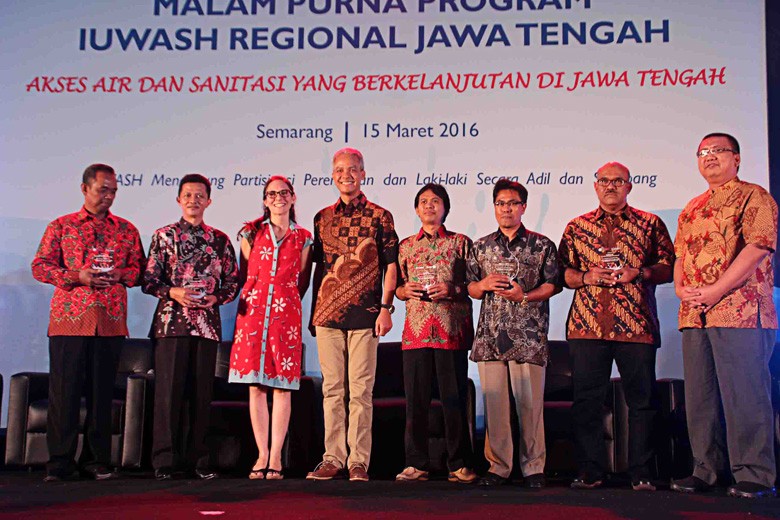Popular Reads
Top Results
Can't find what you're looking for?
View all search resultsPopular Reads
Top Results
Can't find what you're looking for?
View all search resultsQuarter of C.Javanese still defecate in open
Change text size
Gift Premium Articles
to Anyone
 Job well done: Central Java Governor Ganjar Pranowo (fourth left), USAID Indonesia environment office deputy director Heather D’Agnes (third left) and National Development Planning Board (Bappenas) head of drinking water and sanitation Eko Wiji Purwanto (right) pose with volunteers involved in the USAID-IUWASH program that has developed better drinking water and sanitation management in Central Java at an event in Semarang, Central Java, on March 15.
(thejakartapost.com/Suherdjoko)
Job well done: Central Java Governor Ganjar Pranowo (fourth left), USAID Indonesia environment office deputy director Heather D’Agnes (third left) and National Development Planning Board (Bappenas) head of drinking water and sanitation Eko Wiji Purwanto (right) pose with volunteers involved in the USAID-IUWASH program that has developed better drinking water and sanitation management in Central Java at an event in Semarang, Central Java, on March 15.
(thejakartapost.com/Suherdjoko)
A
lmost 25 percent of the people of Central Java still defecate in the open, especially in rivers, putting them at greater risk of contracting water-borne diseases, a health official says.
Central Java Health Agency chief Yulianto Prabowo said in Semarang on Thursday that only 78 percent of residents in the province had toilets in their homes. Several regencies, especially in the western part of the province, still need to increase their awareness on environmental health, he said.
“Of the 35 regencies and municipalities in Central Java, those located on the western side of the province need to pay more attention to improving environmental health. These areas include Banyumas, Brebes, Cilacap, Pemalang and Tegal. The poverty level in those areas is relatively high and so improving the health of people there is important,” said Yulianto.
Central Java Governor Ganjar Pranowo voiced apprehension about the matter. During the closing ceremony of a five-year partnership between US Agency for International Development (USAID) and the Indonesian people and government via the Indonesia Urban Waste, Sanitation and Hygiene (IUWASH) program, Ganjar advised Wonosobo residents to stop the unhealthy practice of defecating in the open.
“Many people in Wonosobo still defecate in the open. Some of them are better off, but still they don’t change their ways. I once urged a Wonosobo resident, who was building a house, to make an indoor toilet. A toilet was then installed in a tiny space in the house. This is part of efforts to encourage people to adopt a healthier lifestyle,” said Ganjar.
In Central Java, IUWASH assisted in providing people with adequate access to clean water and sanitation in 10 regencies and municipalities over the past five years. They comprise seven regencies – Batang, Kendal, Klaten, Kudus, Rembang, Semarang and Sukoharjo – and three municipalities, namely Salatiga, Semarang and Surakarta.
Semanggi district, in Surakarta, for instance, has a poor community, which now has a public toilet and access to clean water provided by Surakarta tap water company PDAM. People in the district used to defecate in rivers.
Yulianto further explained that there was a need to improve environmental health, especially around public spaces and markets. On the other hand, Central Java provided access to clean water to 80 percent of its residents.
He said Central Java had 279 hospitals spread evenly across 35 regencies and municipalities across the province. A community health center with doctors can be found in every district.
“Community health centers are even available in remote areas such as Karimunjawa in Jepara regency and Kampung Laut in Cilacap,” said Yulianto, adding that improvement was needed because to access hospitals, people in the remote areas had to travel by boat. (ebf)









